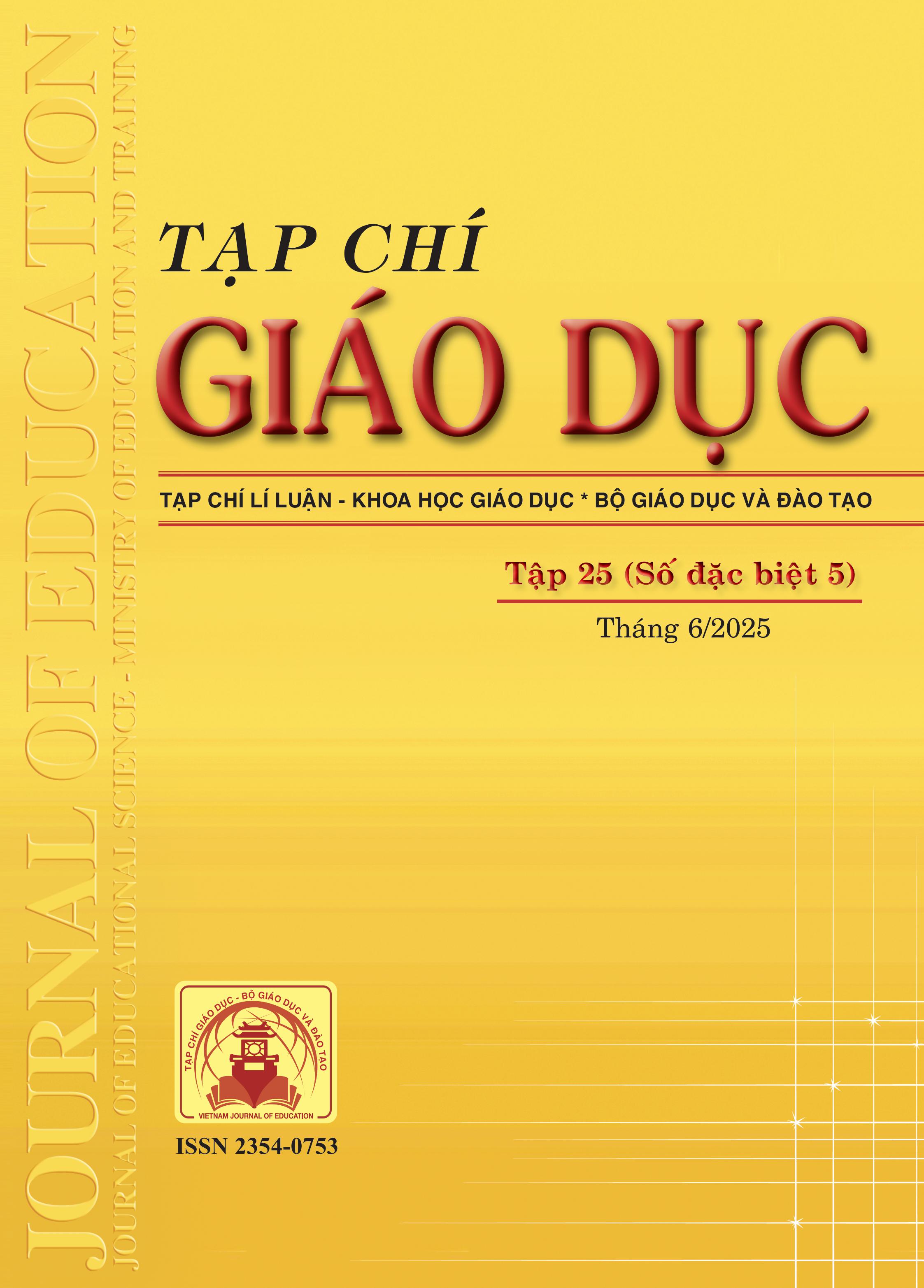Thực trạng dạy học giải quyết vấn đề nhằm phát triển thành phần năng lực nhận thức hóa học cho học sinh Trung tâm Giáo dục nghề nghiệp - Giáo dục thường xuyên ở Hưng Yên
Tóm tắt
The component of expertise competence in chemistry plays an important role in the holistic development of students during their process of understanding the natural world. The paper focuses on examining the practical basis of the chemical expertise competence component as well as the application of the problem - solving teaching method in chemistry education. The survey on the current situation of problem - solving teaching aimed at developing the chemical expertise competence component in students was conducted at vocational and continuing education centers in Hung Yen, involving 16 chemistry teachers and 367 tenth-grade students. The results show that the application of the problem - solving teaching method to develop the chemical expertise competence component in students remain limited. Students at vocational education and continuing education centers have not fully demonstrated their chemical expertise competence component. Therefore, implementing the problem - solving teaching method with this group of students is expected to result in noticeable improvements. This need to be validated through experimentation.
Tài liệu tham khảo
Baddeley, A. D., & Hitch, G. J. (2000). Development of working memory: Should the Pascual-Leone and the Baddeley and Hitch models be merged?. Journal of Experimental Child Psychology, 77(2), 128-137.
Baş, M., & Bolat, Y. (2022). The impact of cognitive competence on critical thinking skills: An educational science study with school counsellors. Education Quarterly Reviews, 5. Special Issue 2: Current Education Research in Turkey, 53-64.
Bộ GD-ĐT (2018a). Chương trình giáo dục phổ thông - Chương trình tổng thể (ban hành kèm theo Thông tư số 32/2018/TT-BGDĐT ngày 26/12/2018).
Bộ GD-ĐT (2018b). Chương trình giáo dục phổ thông môn Hóa học (ban hành kèm theo Thông tư số 32/2018/TT-BGDĐT, ngày 26/12/2018 của Bộ trưởng Bộ GD-ĐT).
Cockrell, K. S., Caplow, J. A. H., & Donaldson, J. F. (2000). A context for learning: Collaborative groups in the problem-based learning environment. The Review of Higher Education, 23(3), 347-363.
Dolmans, D. H., Wolfhagen, I. H., Van Der Vleuten, C. P., & Wijnen, W. H. (2001). Solving problems with group work in problem‐based learning: hold on to the philosophy. Medical Education, 35(9), 884-889.
Edens, K. M. (2000). Preparing problem solvers for the 21st century through problem-based learning. College Teaching, 48(2), 55-60.
Gijbels, D., Dochy, F., Van den Bossche, P., & Segers, M. (2005). Effects of problem-based learning: A meta-analysis from the angle of assessment. Review of Educational Research, 75(1), 27-61.
Hmelo, C. E., & Ferrari, M. (1997). The problem-based learning tutorial: Cultivating higher order thinking skills. Journal for the Education of the Gifted, 20(4), 401-422.
Hmelo-Silver, C. E. (2004). Problem-based learning: What and how do students learn?. Educational Psychology Review, 16, 235-266.
Hung, W., Jonassen, D. H., & Liu, R. (2008). Problem-based learning. In Handbook of research on educational communications and technology (pp. 485-506). Routledge.
Jonassen, D. H. (2000). Toward a design theory of problem solving. Educational Technology Research and Development, 48(4), 63-85.
Kolodner, J. L., Hmelo, C. E., & Narayanan, N. H. (1996). Problem-based learning meets case-based reasoning. In Edelson, D. C., and Domeshek, E. A. (eds.), Proceedings of ICLS 96, AACE, Charlottesville, VA, pp. 188-195.
Mentzer, G. A., Czerniak, C. M., & Brooks, L. (2017). An Examination of Teacher Understanding of Project Based Science as a Result of Participating in an Extended Professional Development Program: Implications for Implementation. School Science and Mathematics, 117(1-2), 76-86.
Neisser, U., Boodoo, G., Bouchard Jr, T. J., Boykin, A. W., Brody, N., Ceci, S. J., ... & Urbina, S. (1996). Intelligence: knowns and unknowns. American Psychologist, 51(2), 77.
Nguyễn Kim Chi, Đặng Thị Thuận An, Lê Trần Diệu My, Nguyễn Thị Lan Anh, Dương Thị Tuyết Nữ (2023). Vận dụng mô hình 5E trong dạy học chủ đề “Nguyên tố nhóm VIIA” (Hóa học 10) nhằm phát triển năng lực nhận thức hóa học cho học sinh trung học phổ thông. Tạp chí Giáo dục, 23(số đặc biệt 7), 76-82.
Piaget J. (1977). The Development of Thought: Equilibration of Cognitive Structures. Blackwell, Oxford, UK.
Phạm Ngọc Sơn, Đặng Thị Thuận An, Vũ Thị Thu Hoài Phạm Hồng Bắc (2025). Áp dụng công nghệ thực tế ảo tăng cường (AR) trong dạy học nội dung “Liên kết hóa học” nhằm nâng cao năng lực nhận thức hóa học. Tạp chí Khoa học, Trường Đại học Sư phạm Hà Nội, 70(1A), 117-125.
Sun, R. C., & Hui, E. K. (2012). Cognitive competence as a positive youth development construct: A conceptual review. The Scientific World Journal, 2012(1), 210953.
Đã Xuất bản
Cách trích dẫn
Số
Chuyên mục
Giấy phép

Tác phẩm này được cấp phép theo Ghi nhận tác giả của Creative Commons Giấy phép quốc tế 4.0 .












